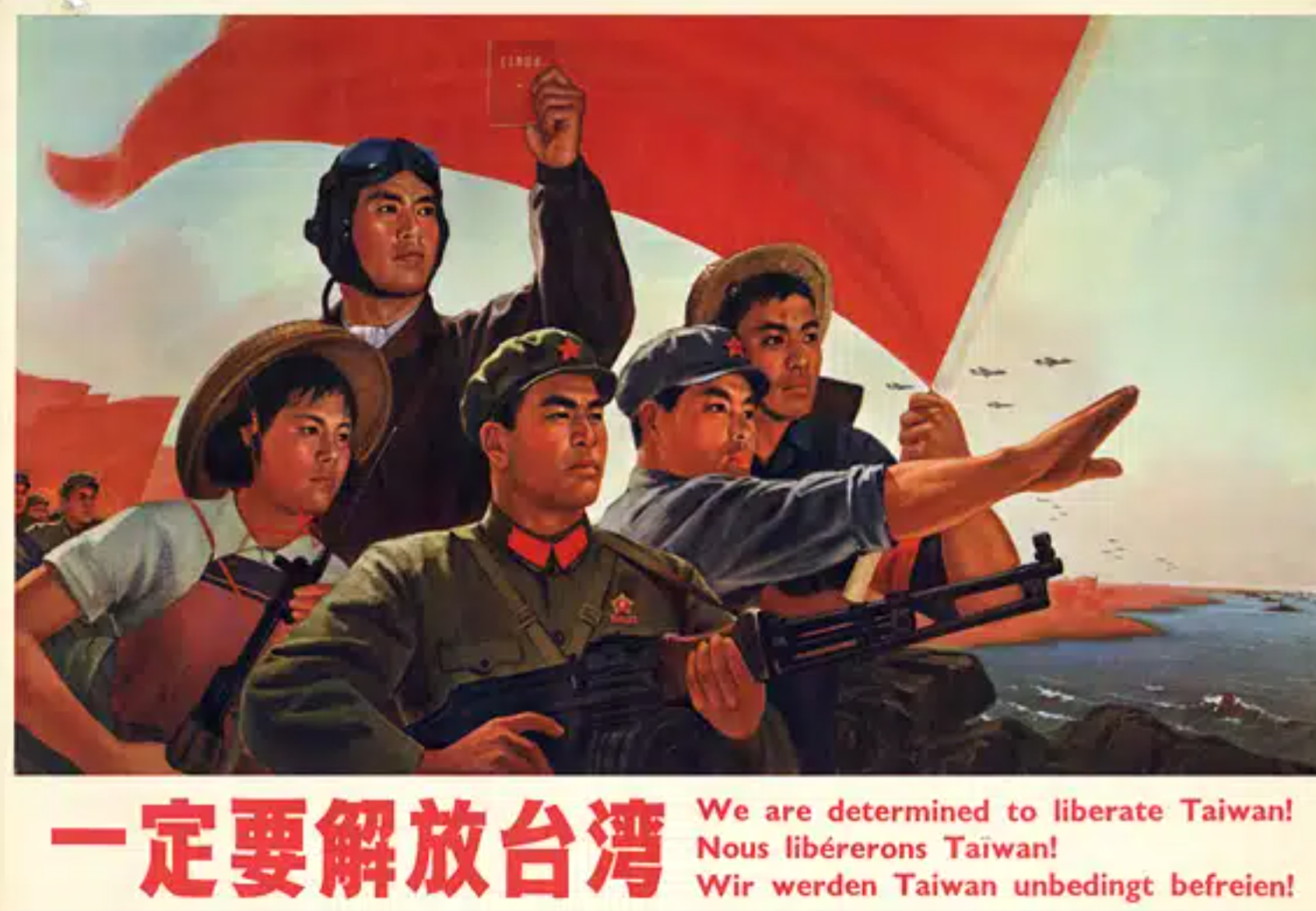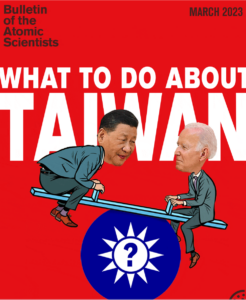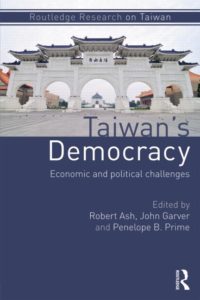
Source: https://chineseposters.net/posters/e3-748
If one of the most liberal and vibrant democracies in the world could simply be wiped off the face of the map by a neo-totalitarian superpower aggressor, what would this imply for the future of freedom in Asia? two leading analysts ask.
For many years to come, the most critical strategic priority for the United States in the Indo-Pacific will be preventing China from swallowing a democratic and technologically advanced Taiwan, the Hoover Institution’s Larry Diamond and James O. Ellis, Jr. observe:
Taiwan is a very successful “third wave” democracy; indeed, it is one of the most liberal, “high-quality” democracies in Asia and by some international assessments, rates as more democratic than the United States…..Today’s China is a neo-totalitarian regime that represents a growing risk to peace. Over the next decade, a Chinese attack on Taiwan cannot be avoided—unless the Chinese leadership is forced to accept that the costs of a military invasion would be too great to bear. Hence the need for a “porcupine strategy” in which Taiwan fields large quantities of small, mobile, affordable, and resilient anti-air and anti-ship systems to resist airborne or amphibious invasion.

The U.S. approach to deterrence differs from its Chinese counterpart in ways that lend Washington several advantages, analyst Joel Wuthnow writes for Foreign Affairs:
- First, the U.S. deterrence strategy emphasizes coordinating with allies. Whereas China lacks allies, the United States works closely with Australia, Japan, the Philippines, and others in the Indo-Pacific on a range of security issues. Some of these countries could even become directly involved in a Taiwan conflict, creating additional military risks for Beijing. And with China’s nuclear upgrades casting a pall over the region, the United States may double down on extended deterrence—the idea that any nuclear strike on an ally would be treated the same as one on the U.S. homeland.
- Second, the U.S. deterrence strategy aims to bring all the tools of national power together in a coordinated way. China’s policy of strategic deterrence revolves around the military, but the U.S. approach involves the participation of agencies such as the State Department and the Treasury Department. Sanctions against Russia have suggested to Beijing that aggression against Taiwan would invite not only military risk but also U.S.-led sanctions, supported by European and Asian industrial democracies. China could find it difficult to inoculate itself against such pressure because of its integration in the global financial and trading systems.
China’s control of Taiwan has been shorter and patchier than Beijing’s Ambassador to Australia Xiao Qian said in a series of misleading claims. And although past Chinese dynasties like the Ming and Qing exercised incomplete influence and control over Taiwan, the island has never been ruled by the PRC, analyst Benjamin Herscovitch writes for The Sydney Morning Herald.
The ambassador’s misrepresentation might seem like an arcane matter of diplomatic verbiage. But the grim reality is that Taiwan’s liberal democracy and the rights and freedoms of its 24 million people could suffer monstrous consequences if these Chinese government deceptions take hold.The ambassador’s misrepresentation might seem like an arcane matter of diplomatic verbiage. But the grim reality is that Taiwan’s liberal democracy and the rights and freedoms of its 24 million people could suffer monstrous consequences if these Chinese government deceptions take hold.The ambassador’s misrepresentation might seem like an arcane matter of diplomatic verbiage. But the grim reality is that Taiwan’s liberal democracy and the rights and freedoms of its 24 million people could suffer monstrous consequences if these Chinese government deceptions take hold.International security researcher
 There is a strong moral case for helping Taiwan to defend itself, Diamond and Ellis add. A Chinese military conquest (or coerced surrender) of Taiwan would not bring anything like the promised “one country, two systems,” which was never fully honored in Hong Kong but has been completely eviscerated in the last few years. Taiwan would be directly ruled by Beijing as the 23rd province of the PRC, with its extraordinary democratic pluralism crushed and its most prominent and outspoken democrats thrown in prison, they write for The Bulletin of the Atomic Scientists:
There is a strong moral case for helping Taiwan to defend itself, Diamond and Ellis add. A Chinese military conquest (or coerced surrender) of Taiwan would not bring anything like the promised “one country, two systems,” which was never fully honored in Hong Kong but has been completely eviscerated in the last few years. Taiwan would be directly ruled by Beijing as the 23rd province of the PRC, with its extraordinary democratic pluralism crushed and its most prominent and outspoken democrats thrown in prison, they write for The Bulletin of the Atomic Scientists:
As we work to strengthen our ability, and Taiwan’s, to respond to and defeat (and thus hopefully deter) a Chinese attack, we must also move with extreme caution to avoid triggering the development we are trying to deter. One element of this is ensuring that the next Taiwan government doesn’t take gratuitous symbolic steps (however modest) to alter the status quo, in ways that Beijing would judge as confirmation that Taiwan is “drifting toward independence.” We should strongly encourage the next Taiwan government to rigorously adhere to the status quo, as Taiwan’s current president, Tsai Ing-wen, has done with admirable restraint.
Jane Corbin’s documentary film, Inside Taiwan: Standing Up to China, is a gripping analysis of potential nuclear Armageddon, The Guardian’s Stuart Jeffries writes:
Ever since democratic Ukraine was invaded this time last year by an authoritarian superpower, the numbers of Taiwanese people paying to train at private military camps has risen exponentially, compulsory military service has been increased from four to 12 months, and Taipei’s “porcupine strategy” now involves stocking up on anti-air, anti-tank and anti-ship weapons so that a smaller force can frustrate a larger (Chinese forces are 12 times bigger than Taiwan’s, Corbin tells us) in line with Kyiv’s example.
Inside Taiwan: Standing Up to China review – a gripping analysis of potential nuclear Armageddon https://t.co/V638bIFhbK
— Democracy Digest (@demdigest) March 24, 2023
Tsai Ing-wen’s two-term presidency, which comes to an end later this year, is predicated on retaining Taiwanese democracy in the face of Beijing’s offer of reunification under an approach of “one country, two systems”, Jeffries adds. That principle which, as the relatively recent crushing of the pro-democracy movement in Hong Kong demonstrated so clearly, means nothing in practice.
We do not favor a formal change in the policy of strategic ambiguity, Diamond and Ellis add. Rather, we think the right course of action is to increasingly make it clear to Beijing’s leaders, and to Taiwan’s society and government, that the United States is prepared to fight to help Taiwan defend its democracy and autonomy if it should be attacked without provocation, and that we are steadily increasing our military readiness and resolve to do so. RTWT







